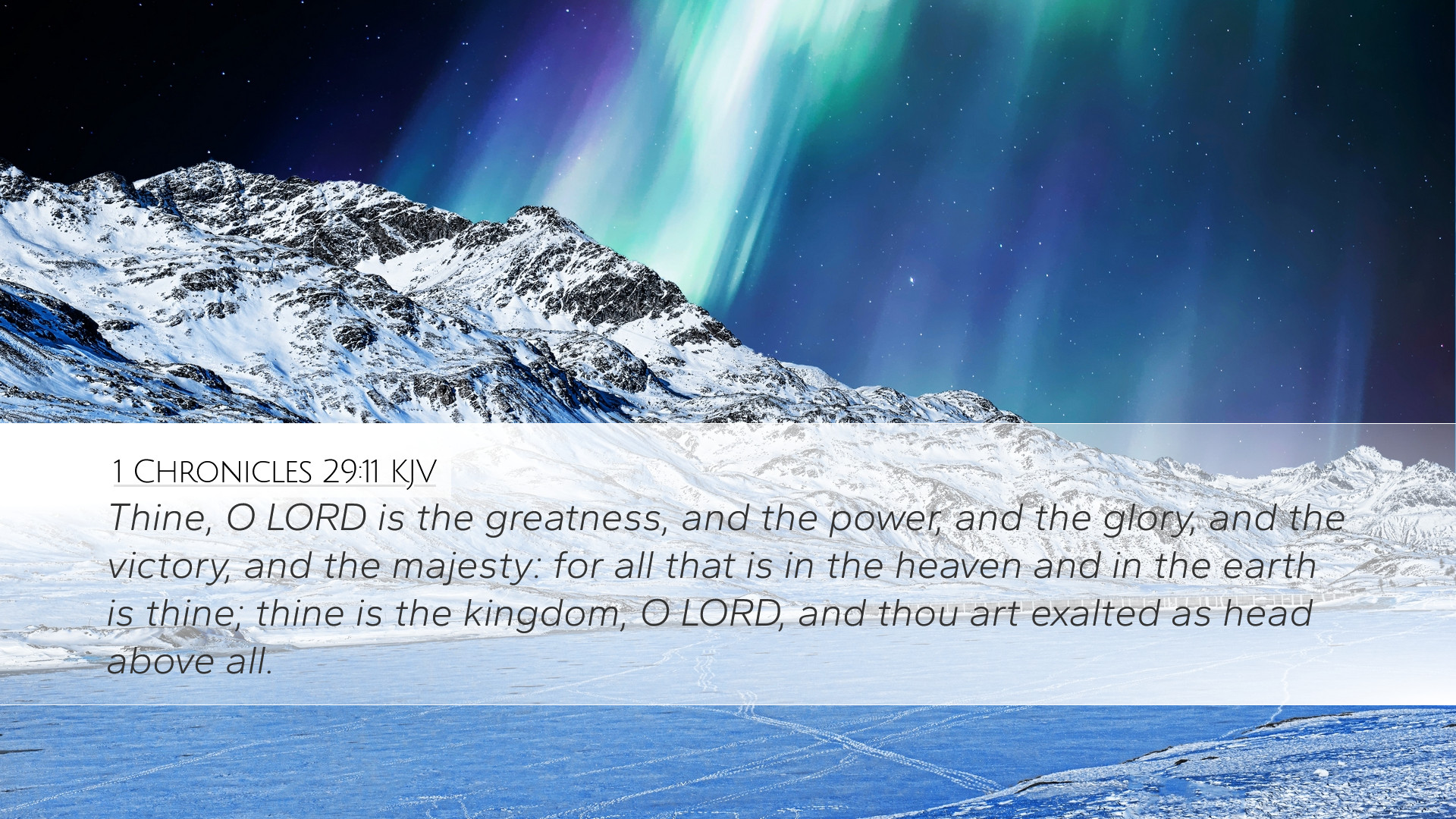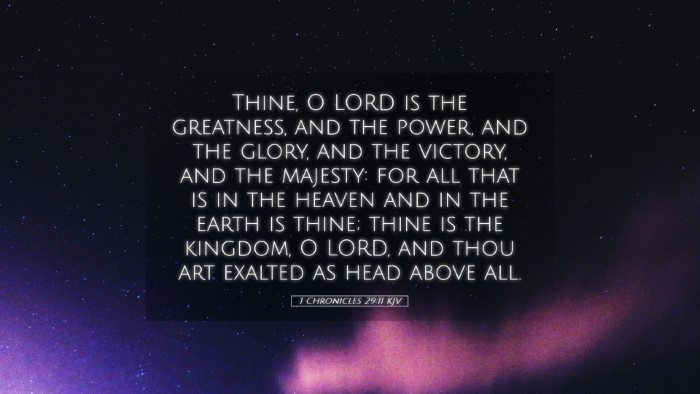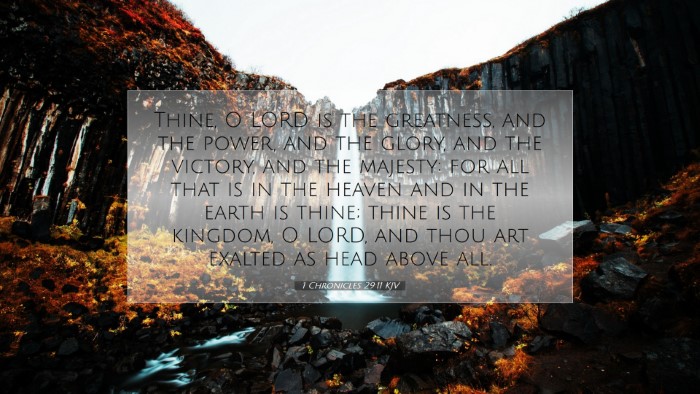Commentary on 1 Chronicles 29:11
Bible Verse: "Thine, O Lord, is the greatness, and the power, and the glory, and the victory, and the majesty: for all that is in the heaven and in the earth is thine; thine is the kingdom, O Lord, and thou art exalted as head above all."
Introduction
This profound verse from 1 Chronicles 29:11 encapsulates a moment of worship and ascription of majesty to God. David, the author, acknowledges the supremacy of God over all creation. This commentary draws insights from notable public domain sources to delve into the theological layers of this verse, providing meaningful reflections for pastors, students, theologians, and scholars.
Contextual Background
The context of 1 Chronicles focuses on the reign of David, particularly his preparations for the building of the temple. David acknowledges the role of God in the blessings that Israel has received, leading him to exalt God’s name in a moment of prayer before the assembly of Israel. Understanding this backdrop is crucial for interpreting the declarative nature of the verse.
Matthew Henry's Insights
- Divine Sovereignty: Henry emphasizes that the verse reveals God’s absolute sovereignty. "Thine, O Lord, is the greatness," he notes, highlighting that all attributes of greatness derive from God. His power, glory, and majesty are intrinsic to His nature.
- God’s Ownership: The phrase "for all that is in the heaven and in the earth is thine" reflects not just God's ownership but His lordship over all creation. Henry draws attention to the implications of this ownership for believers, asserting that they ought to live in a way that acknowledges God's supreme authority.
- Exaltation of God: Henry concludes that God's exaltation as "head above all" calls for humility and worship from humanity, emphasizing that all we possess and achieve is ultimately from Him.
Albert Barnes' Commentary
- Holistic Acknowledgment: Barnes points out that this verse is a full acknowledgment of God’s dominion. He breaks down each attribute mentioned—greatness, power, glory, victory, and majesty—arguing that these collectively represent God's identity and actions throughout history.
- Response of Worship: Barnes suggests that such an acknowledgment should lead to a response of worship and reverence. He stresses that recognizing God’s greatness is imperative for the believer's life and leads toward a proper understanding of human humility before God.
- Kingdom and Authority: The articulation that "thine is the kingdom, O Lord" is significant for Barnes. It recognizes that while worldly kingdoms may fluctuate, God's kingdom endures eternally, assuring believers of their place in His sovereign plan.
Adam Clarke's Perspective
- Nature of God’s Greatness: Clarke elaborates on the term "greatness," suggesting that it encompasses both God's vastness and His omnipotence. He reinforces that God's greatness is not merely theoretical but is actively displayed in His creation and providence.
- Victory and Majesty in Christ: Clarke makes a theological link between this Old Testament passage and the victory that believers find in Christ. He posits that understanding God's majesty lays a foundation for comprehending Christ's authority and victory over sin and death.
- Human Response: Clarke highlights that the proper response to recognizing God's nature is a life of praise, service, and stewardship, indicating that believers should align their lives with divine truth, reflecting the glory of God in their actions.
Theological Reflections
This verse prompts important theological reflections on several fronts:
- The Sovereignty of God: The recognition of God as sovereign affirms His ultimate authority over all aspects of life. This underpins a Christian worldview that sees God as intimately involved in creation and history.
- The Nature of Worship: The acknowledgment of God's attributes fosters a deeper understanding of worship. Worship is not merely a function of singing or prayer but a holistic lifestyle of homage to God that acknowledges His rightful place as Creator and King.
- Humility Before God: In realizing the magnitude of God's greatness, humans are called to humility. This humility is vital as it shapes interactions within communities, teaching believers to serve and uplift others rather than seek self-exaltation.
- Hope in God's Kingdom: The affirmation that "thou art exalted as head above all" serves as a reminder to believers of the hope found in God’s eternal kingdom, which transcends earthly trials and tribulations.
Practical Applications
The insights gleaned from this verse lead to several practical applications for contemporary believers:
- Worship as a Lifestyle: Encourage individuals and congregations to incorporate acts of worship into daily life, recognizing God’s presence and sovereignty in mundane tasks and major decisions alike.
- Stewardship of Creation: Acknowledging that all belongs to God prompts responsible stewardship of resources, promoting environmental care, ethical use of resources, and a commitment to justice.
- Building a Community of Humility: Foster an environment in churches that emphasizes humility, mutual growth, and a shared mission to uplift one another in faith.
- Hope and Encouragement: Use the truths stated in this verse to provide hope in counseling settings, affirming the eternal nature of God's kingdom amidst life’s uncertainties.
Conclusion
1 Chronicles 29:11 serves as a robust affirmation of God's supremacy and a call to worship that transcends the temporal. The insights from the commentaries of Matthew Henry, Albert Barnes, and Adam Clarke provide rich theological depths that serve to inform and enrich the lives of pastor, student, and scholar alike. Engaging with this scripture fosters not only theological understanding but also inspires a life lived in obedience and worship to the God who reigns above all.


